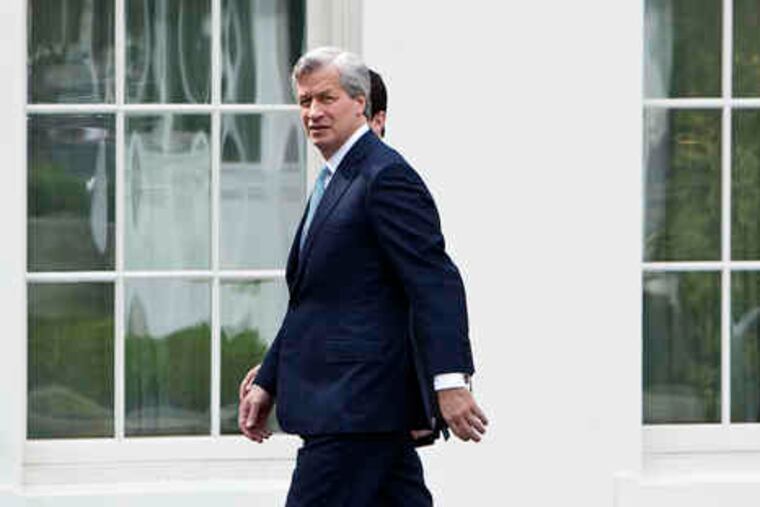PhillyDeals: Roundtable was where CEOs, pols let hair down
When bank CEOs trooped down to Capitol Hill for a public scolding by U.S. House members in March, the proceedings led the TV news.

When bank CEOs trooped down to Capitol Hill for a public scolding by U.S. House members in March, the proceedings led the TV news.
And why? Bankers and congressmen, in those situations, don't say what they really think, says Rep. Paul Kanjorski (D., Pa.), head of the House subcommittee on capital markets that is helping rewrite bank regulations in response to the financial crisis.
"That's oatmeal," Kanjorski said of members' public remarks. "It's sanitized. Nobody wants to say things that will be held up against us."
Candor is saved for private meetings, like the
second gathering of the Bipartisan Financial Regulatory Roundtable on April 27, where JPMorgan chief executive officer Jamie Dimon and Stanford economics professor John Taylor met with Kanjorski, U.S. Rep. Scott Garrett (R., N.J.), and 10 committee members for dinner, drinks, questions, and answers.
"He's an extraordinarily fast-witted fellow," said Kanjorski of Dimon. "He's not doctrinaire. He was facile in approaching problems. He had a very open mind in figuring out fundamental causes and cures. My general information, after talking to other members, they were highly impressed."
Wish we had seen that on cable news. But what did Dimon say? "I'm sworn not to quote him," Kanjorski told me.
Dimon "simply thinks it's healthy to have an ongoing dialogue with a variety of people on important issues like this," Dimon spokesman Joe Evangelisti told me, adding the bank had "nothing in writing" about the boss' remarks.
So what was accomplished? "It's like we're all swimming without our trunks," Kanjorski told me. "We're not pretending we know anything. We're out in the open, talking to everybody. Once you do that, you're relaxed, it changes your attitude . . .
"We're working on regulations intended to be active for 75 or 100 years. I hope this is a way for bipartisanship to show up."
New campus
Eastern University, the Baptist-affiliated college based in St. Davids, has leased 60,000 square feet to house the new Eastern University Academy Charter School, plus a graduate urban-studies program and other classes, at Falls Center, the former Medical College of Pennsylvania complex owned by an affiliate of Iron Stone Real Estate Group. Eastern spokeswoman Linda Olson confirmed the plan.
"It's a dramatic shift for them. It represents their commitment to the city," said Iron Stone partner Jason Friedland. He wouldn't say what Eastern's paying. Iron Stone is developing offices, apartments, and stores on the 12-acre site.
Bad news
Ex-GE boss Jack Welch, in town this week to help promote wife Suzy's self-help book, 10-10-10, told me it has been bittersweet catching up with NBC local-television executives at stations like Channel 10 in Philadelphia. Eva Blackwell of Channel 10 had no comment.
"These people used to work for me," Welch said. (GE owns NBC.) "They're really hurting. Local advertising has gone away." Generally, local TV is "in worse shape than newspapers," Welch said.
Didn't Welch and a group of fellow wealthy Bostonians try to buy the Boston Globe a couple of years back? "We came close to buying the Red Sox, we figured they would throw in the newspaper," Welch told me. New York Times Co. owns both the Globe and a stake in the Sox.
"We figured the Globe was worth $50 million - now it's probably negative $50 million - and the (Times' Red Sox stake) about $175 million - now it would be $250 million." But Times Co. "didn't want to talk," Welch added. "They told us it was a 'strategic property.' "
The Times put its Sox stake on the block in January, and it plans job cuts at the money-losing Globe.
No publisher
Eric Mayberry is out as publisher of the daily newspaper Metro Philadelphia, a free handout that litters SEPTA stops across the Philadelphia area, after he tried and failed to buy the paper from its parent, Metro International.
He won't be replaced, and Metro will be run from New York in the future, Mayberry tells me. He'll be a media consultant, lobbyist, and sometime Metro columnist.